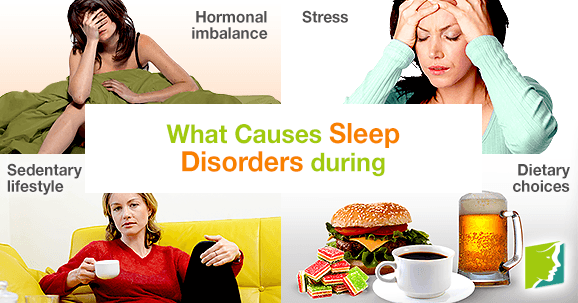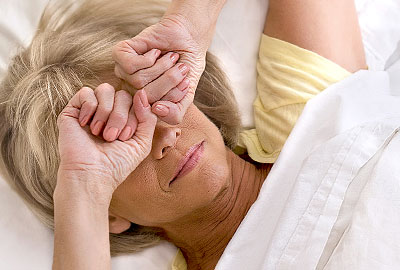Not being able to fall or stay asleep is an extremely frustrating symptom of menopause. After such a long day of battling other menopause symptoms, you just want a restful night's sleep to help get you through the next day. Instead, you may be tossing and turning for hours, waking up short of breath from sleep apnea, or battling weird sensations in your legs through restless leg syndrome (RLS). In order to restore a healthy slumber, it is important to know the main causes for its disruption.
Hormonal Imbalance
The sharp decrease in sex hormones, such as estrogen and progesterone, is the root cause for sleep disruption during menopause. The drop in estrogen can lower the release of the neurotransmitter melatonin, which is essential for a good night's rest. It can also prevent the muscles from relaxing fully, cause night sweats, and disturb breathing when asleep.
Progesterone also has its own sleep-inducing effect, so the lowered levels will make you less sleepy when your head hits the pillow. The drop in this hormone is often the cause of insomnia.
Stress
Another side effect of your lowered estrogen levels is reduced endorphins and serotonin, which keep you happy and relaxed; and an increase of a stress response hormone called cortisol. When you are drowning in a sea of worries upon laying down to sleep, it can be impossible to get past them and fall into dreams.
All of your concerns tend to amplify in the night and can make you paranoid about the littlest things. Insomnia will likely follow from excessive anxiety, so it is important to practice deep relaxation techniques like yoga or meditation for relief.
Sedentary Lifestyle
Exercise during the day. Choose to walk instead of drive whenever possible, as this can help add to the 3 hours of recommended physical activity per week. Aerobics, cardio, and yoga are also good ways to keep moving. Make sure, however, that you don't work out in the evening. This will make it much harder to fall asleep and can even trigger night sweats.
Dietary Choices
If your diet is full of fatty foods, sugar, caffeine, and alcohol, a sleep disorder can most certainly develop. Steer clear of those as much as possible. Instead, intake a balanced diet of whole grains, fruits, colorful veggies, nuts, and lean proteins (such as fish or tofu) to keep your body leveled and ready to sleep.
Sleeplessness is one of the most dreadful symptoms of menopause. When you can't fall sleep, it can really make you feel like something precious has been stolen from you. A good night's rest is essential to maintain a positive and energetic mood. Understand the causes so you can respond accordingly.
Sources
- National Institutes of Health. (2014). Sleep Disorders: Medline Plus. Retrieved March 26, 2014, from http://www.nlm.nih.gov/medlineplus/sleepdisorders.html
- University of Maryland Medical Center. (2013). Adult Sleep Disorders. Retrieved March 26, 2014, from http://umm.edu/programs/sleep/health/sleep-disorders/adult




